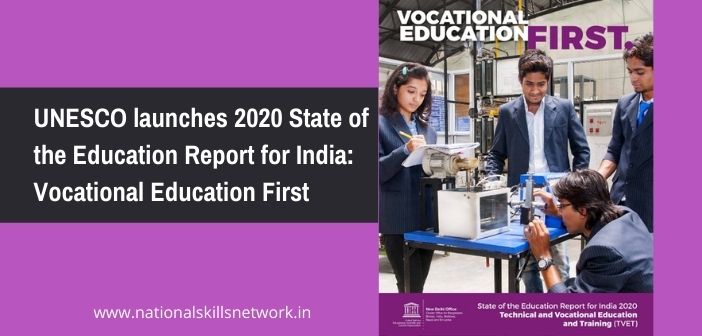UNESCO, New Delhi, has launched the ‘State of the Education Report for India 2020: Technical and Vocational Education and Training (TVET)’ with over 400 attendees including representatives from the government, civil society, academia, partners and youth being present in the virtual event.
The second edition of the State of Education Report focuses on technical and vocational education and training (TVET). With an in-depth analysis of the current state of TVET in India highlighting next practices and recommendations, the Report aims to serve as a reference tool for enhancing and influencing the policies and programs related to skills development in India. It can be used by TVET practitioners, policy makers, private sector and donor agencies for planning future engagements in the TVET sector in India. The Report outlines 10 recommendations to achieve the stated vision for TVET in India.
To read the full report, please visit: https://unesdoc.unesco.org/ark:/48223/pf0000374969
Speaking at the occasion, Mr Eric Falt, Director, UNESCO New Delhi said, “The Report identifies TVET as a key tool for recovery and rehabilitation through a rapid response system of skilling, upskilling and re-skilling. Despite the challenges, the global COVID 19 pandemic has provided an opportunity to expand the digitalization of vocational education and training ensuring the use of distance learning and digital tools.”
 Addressing the attendees, Mr Ramesh Pokhriyal ‘Nishank’, Minister of Education, Government of India said, “with the recent launch of the National Education Policy (NEP) 2020, the relevance of this report is enhanced further as it provides useful inputs for implementing the ideas proposed in the 2020 NEP. I hope this publication will enable cross learning among the multiple stakeholders of the vast vocational education ecosystem and adoption of best practices.” –
Addressing the attendees, Mr Ramesh Pokhriyal ‘Nishank’, Minister of Education, Government of India said, “with the recent launch of the National Education Policy (NEP) 2020, the relevance of this report is enhanced further as it provides useful inputs for implementing the ideas proposed in the 2020 NEP. I hope this publication will enable cross learning among the multiple stakeholders of the vast vocational education ecosystem and adoption of best practices.” –
Mr Mahendra Nath Pandey, Minister of Skill Development and Entrepreneurship, Government of India said, “Our Ministry is making continuous efforts to enable social justice and livelihoods through quality lifelong learning opportunities for all. This report, I am sure will provide useful guidance and promising practices towards our endeavour and ongoing efforts towards the achievement of the Skill India mission.”
The Report provides an overview of the present capacity for TVET provision through short-term and long-term courses, by state as well as non-state actors, and also through educational institutions such as schools, colleges and universities. It discusses previous education policies, and the approach to TVET provision in the light of the priorities of the country as reflected in NEP 2020, as also the priorities that have come with the adoption of the 2030 Agenda for Sustainable Development of the United Nations (UN).
Finally, in order to achieve evidence-based results, the Report outlines a set of ten recommendations that should be adopted to help achieve the stated vision for TVET in the country. These include critical recommendations for informal workers who make up the largest portion of India’s workforce. In particular, the Report makes important recommendations towards preserving and promoting India’s vast reserves of tangible and intangible cultural heritage, an activity that can create livelihoods for large numbers of its citizens and also instil a sense of pride and ownership among the youth.
Also read: UNESCO launches Global Skills Academy to boost employability of one million youth https://nationalskillsnetwork.in/unesco-launches-global-skills-academy-to-boost-employability-of-one-million-youth/













Comments 1